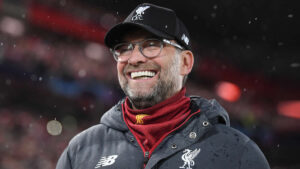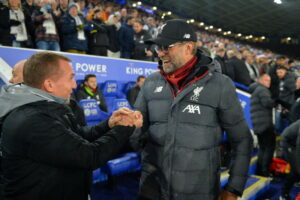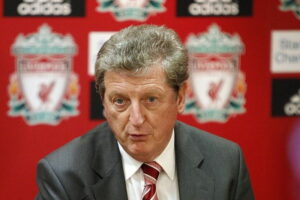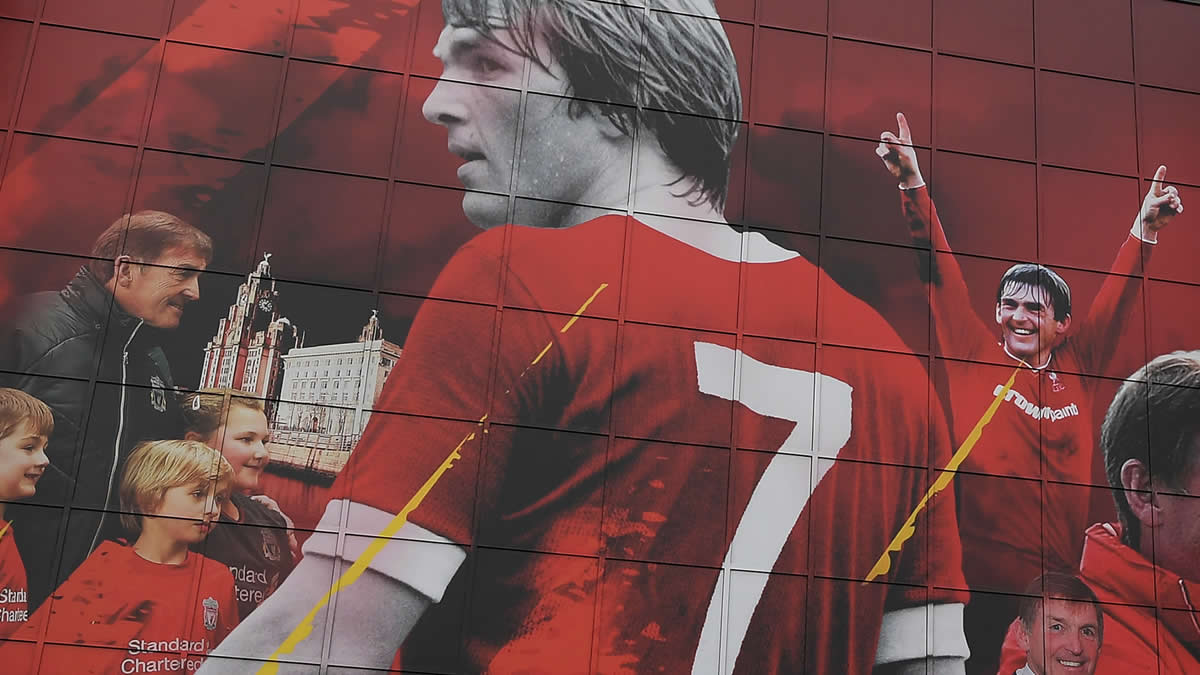
If you want to talk about Liverpool Football Club, you have to talk about Sir Kenneth Mathieson Dalglish. Whilst Bill Shankly will always be considered the father of modern day Liverpool, Kenny Dalglish is something akin to a favourite uncle.
Born on the fourth of March 1951, Dalglish grew up in the Scottish city of Glasgow and moved to the Scottish Giant in 1968 after beginning his youth career at Cumbernauld United. He played for the Bhoys for eight years, signing for Liverpool in 1977 and making his debut on the 13th of August. He was, though, so much more than just a player.
Kenny’s Early Years
Kenny Dalglish the son of an Engineer and was born in the suburb of Dalmarnock, in the east end of Glasgow. He moved to the north of the city, then when he was 14 his family moved to a newly built tower block that overlooked Ibrox, the home of Rangers. Dalglish had, somewhat ironically, grown up supporting Rangers. A big fan of football, he was a goalkeeper when he first started playing the game at Miltonbank Primary School. When he moved to High Possil Senior Secondary School, he won numerous five-a-side competitions as well as the Scottish Cup, being selected for the Scottish School Boys as a result.
Having been undefeated in a team that won the Home Nations Victory Shield, he had trials at both Liverpool and West Ham United, but was unsuccessful in both. His career was only just getting started, however, and in 1967 he signed his first professional contract to play for the rivals of his boyhood club, Celtic. He was signed up in spite of the fact that Sean Fallon saw Rangers-related memorabilia all over the walls when he attended the Dalglish’s home to see his parents. He was immediately loaned out to Cumbernauld United, where he scored 37 goals, having long been moved out of the goalkeeper position.
Having worked as an apprentice joiner during his time at Cumbernauld, Dalglish returned to Celtic under manager Jock Stein. Stein put him in what was known as the ‘Quality Street Gang’, which was a reserve team with a large number of well-fancied players. On the 25th of September 1968, Dalglish made his first team debut when he came on a substitute in a 4-2 win against Hamilton Academical in the Scottish League Cup. He didn’t get his first team league debut until October of the following year, when he appeared in a 7-1 win over Raith Rovers, playing in the next three league games but failing to score in any of them.
In 1971, Dalglish endured his first taste of disaster when he was in the stands for the Old Firm game in which 66 Rangers fans died. It wasn’t until the 1971-1972 season that he really established himself as a first team player, scoring his first competitive goal for Celtic on the 14th of August 1971. He went on to find the next 29 times in 53 appearances over the courses of the campaign, helping the Hoops win their seventh consecutive Scottish title. The following season, he was the club’s top scorer, netting 39 goals in all competitions. In 1973-1974, Celtic won a league and cup double.
The Move To Anfield
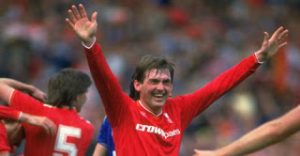 In the 1975-1976 season, Kenny Dalglish was made the Celtic captain; a sign of how much he was respected at the club. He scored 27 goals across all competitions the following season as the club once again picked up a league and cup double, with Dalglish’s performances enough to catch the eye of some people south of the border. One of them was Bob Paisley, who spent a British record fee of £440,000 on the young Scot in a move that proved to be unpopular with Celtic fans. Indeed, when he returned to Celtic Park in 1978 to take part in a testimonial match for Jock Stein, he was widely booed by the Celtic fans in attendance for leaving them.
In the 1975-1976 season, Kenny Dalglish was made the Celtic captain; a sign of how much he was respected at the club. He scored 27 goals across all competitions the following season as the club once again picked up a league and cup double, with Dalglish’s performances enough to catch the eye of some people south of the border. One of them was Bob Paisley, who spent a British record fee of £440,000 on the young Scot in a move that proved to be unpopular with Celtic fans. Indeed, when he returned to Celtic Park in 1978 to take part in a testimonial match for Jock Stein, he was widely booed by the Celtic fans in attendance for leaving them.
Not that it mattered to Liverpool supporters. Dalglish had been brought in as a replacement for the hugely popular Kevin Keegan, settling into his new club nice and quickly. His first league goal came in his First Division debut, finding the net against Middlesbrough before also scoring a week later in his Anfield debut, helping the Reds to defeat Newcastle 2-0. He played 62 times during his first season at Liverpool, scoring 31 goals. The most important of them was unquestionably the winner in the European Cup final, helping the Reds to defend the title against Club Brugge.
The season that followed saw the Scot named the Football Writers’ Association Footballer of the Year. He hadn’t missed a single league game for the Reds until the 1980-1981 campaign, demonstrating a desire to get on the pitch no matter what. He only scored eight times as the Reds slumped to a fifth place finish in the First Division, but he did manage to help the club to win the European Cup as well as the Football League Cup. The Reds recovered to win back their title the following year, with Dalglish also rediscovering his goal scoring form along the way, being the only ever-present in the Liverpool team that season.
This was also when Dalglish began to form a formidable partnership with Ian Rush, being voted the PFA Players’ Players of the Year for the 1982-1983 campaign as he netted 18 times and the Reds were champions of England once more. It was at the end of this season that Dalglish’s goal scoring exploits began to drop off, in spite of the fact that he remained a regular player in the team. Liverpool followed up the title winning season with a defence of their title, making it the fifth title since Dalgish swapped Celtic for Liverpool, whilst also winning three European Cups and four League Cups during the same time period.
Dalglish The Manager
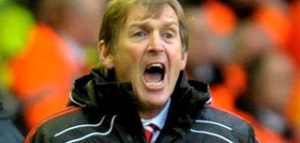 Kenny Dalglish endured the second tragedy of his relatively short life when the Heysel Stadium Disaster occurred at the European Cup final at the end of the 1984-1985 season. The disaster resulted in the deaths of 39 people, who were mostly fans of the Italian club Juventus who Liverpool lost to in the final, as well as around 600 others being injured. The result for English clubs was a ban from Europe, whilst for Liverpool it led to a decision from the manager, Joe Fagan, to retire. For the Liverpool board, the desire to continue the boot room tradition meant that there was only one person to take over the role.
Kenny Dalglish endured the second tragedy of his relatively short life when the Heysel Stadium Disaster occurred at the European Cup final at the end of the 1984-1985 season. The disaster resulted in the deaths of 39 people, who were mostly fans of the Italian club Juventus who Liverpool lost to in the final, as well as around 600 others being injured. The result for English clubs was a ban from Europe, whilst for Liverpool it led to a decision from the manager, Joe Fagan, to retire. For the Liverpool board, the desire to continue the boot room tradition meant that there was only one person to take over the role.
Dalglish was appointed the manager of the club for the 1985-1986 season, picking himself just 21 times in the league. The Reds won yet another title, making it to the final of the FA Cup to face city rivals Everton. He did pick himself for that, though Liverpool were trailing 1-0 at half-time. Two goals from Ian Rush and one from Craig Johnston saw the Reds complete a league and cup double in Dalglish’s first season in the hot seat. That was in no small part thanks to the fact that the Scot scored the winning goal on the final day of the season to seal the title at Stamford Bridge.
In the 1986-1987 campaign, Dalglish did better from a persona point of view, scoring six times across 18 appearances. He was, though, determined to give young players a real chance in the first team, with Liverpool missing out on the title to Everton. When Ian Rush was sold to Juventus in 1987, Dalglish needed to rebuilt the team and did so by bringing in both John Aldridge and Peter Beardsley. The side that he assembled is widely considered to be one of the best Liverpool teams ever, with the club regaining their title after racking up 90 points, having lost just twice all season.
Dalglish played just twice that year, not playing at all in the 1988-1989 campaign. He made his final appearance for Liverpool in the league on the fifth of May 1990, coming on as a substitute in a game against Derby County. It meant he was one of the the oldest players to appear for the Reds at the time. For Dalglish, though, his time in charge at Anfield was put under immense pressure the year before. For the third time in his life, the Scot had witnessed a disaster unfold at a football ground when 97 Liverpool supporters were killed in the Hillsborough Disaster.
Kenny & Hillsborough
The Hillsborough Disaster occurred at Hillsborough Stadium on the 15th of April 1989. It was the result of police negligence, with the South Yorkshire Police feeding friendly members of the press outright lies in the days that followed. When an inquest was held originally, the verdict given was ‘accidental death’.
There was a fight to have the case reopened, which didn’t happen until 2014. That came after an Independent Panel resulted in the accidental deaths verdict being quashed. In spite of the fact that 97 people were effectively murdered, no one has ever been held responsible for their deaths.
For Dalglish, there was a desire to do what was right. He attended as many of the funerals as he could, with other first team players also attending funerals. He carried the weight of the victims and their families on his shoulders in admirable fashion, but it took its toll on him. His presence was considered to be ‘colossal and heroic’, which eventually led to him being given a knighthood. At the end of the 1989-1990 campaign, the Reds won another title under the Scot, but on the 22nd of February 1991, two days after a 4-4 draw with Everton in the FA Cup, he resigned as Liverpool manager.
Dalglish At Blackburn Rovers
Following a few months decompression, which hindsight suggests Liverpool should have granted him without the need to resign, Kenny Dalglish returned to management at Blackburn Rovers. The club had recently been bought by Jack Walker, the multi-millionaire, with the aim of making it the best in the country. They made it out of the Second Division and into the newly formed Premier League by defeating Leicester City in the play-off final, with the club signing Alan Shearer for a British record transfer fee of £3.5 million. It proved to be an inspired move, with Blackburn finishing fourth in their first year back in the top-flight.
The club finished second a year later, losing out to Manchester United, with a new record fee of £5 million being spent to bring Chris Sutton to Ewood Park. The pair made a formidable partnership, meaning that Blackburn and United could both win the title on the final day of the season. United needed to beat West Ham in London and hope that Blackburn lost to, of all teams, Liverpool. The Red defeated their old manager but it didn’t matter as United failed to win their match, seeing Dalglish once again a title winning manager and fittingly lifting the trophy at Anfield.
A Return To Liverpool
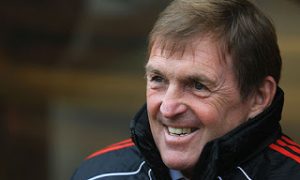 Newcastle United appointed Dalglish as their manager In January of 1997, but his time in charge didn’t go as well as he would have hoped. As a result, he was sacked by Freddie Shephard when the Magpies drew their opening two games of the 1998-1999 campaign. For a short time at the end of the 1990s, Dalglish was made the Director of Football Operations at Celtic, but he was sacked in June of 2000 when Martin O’Neill was brought in as manager. Nine years later and he was back in a job at Liverpool after Rafa Benitez asked him to take on a role at the Academy.
Newcastle United appointed Dalglish as their manager In January of 1997, but his time in charge didn’t go as well as he would have hoped. As a result, he was sacked by Freddie Shephard when the Magpies drew their opening two games of the 1998-1999 campaign. For a short time at the end of the 1990s, Dalglish was made the Director of Football Operations at Celtic, but he was sacked in June of 2000 when Martin O’Neill was brought in as manager. Nine years later and he was back in a job at Liverpool after Rafa Benitez asked him to take on a role at the Academy.
When Benitez was sacked in 2010, there was calls from supporters for Daglish, who had also been made a club ambassador, to replace him. Instead, he advised the club to appoint Roy Hodgson to the role. It was never the right fit for either party, with Hodgson eventually being sacked and replaced by the Scot. His first match in charge was in the FA Cup against Manchester United, losing 1-0 but seeing joy return to the Liverpool fans. He had only been brought in on a temporary basis, but on the 12th of May 2011 it was confirmed that he’d been given a three-year contract.
Sadly for Dalglish, the footballing world had moved on too much for him to be able to compete at the top end of the table. Whilst they struggled in the league, they won the League Cup thanks to a win over Cardiff City, also making it to the final of the FA Cup where they narrowly lost to Chelsea. In spite of winning the club’s first trophy in six years, Fenway Sports Group, the new owners, decided to issue him with his marching orders on the 16th of May 2012. Brendan Rodgers was brought in as his replacement, with Dalglish returning as a non-executive director in October of 2013.
The Sir Kenny Dalglish Stand
Whilst it isn’t something that pleases the majority of Liverpool supporters who understand the club, Dalglish has long been an establishment member. He was made a Member of the Order of the British Empire in 1985, then was made a Knight Bachelor for services to football, charity and the City of Liverpool in 2018. It came 12 years after he had been named top of the 100 Players Who Shook The Kop in a poll of Liverpool supporters. What he gave to Liverpool during his life couldn’t be overstated. As well as being one of the club’s greatest ever players and managers, the Scot also represented the city brilliantly during his life.
It was little surprise, therefore, when a decision was made to rename a stand in his honour. It happened officially on the 13th of October 2017, with the Centenary Stand being renamed as the Sir Kenny Dalglish Stand. It means that, along with the statue of Bill Shankly that stands outside the Kop and the Paisley Gates, named in honour of Bob Paisley, there is a constant reminder of Kenny Dalglish’s brilliance at Anfield. He finishes his career at Liverpool having made 515 appearances and scoring 172 goals, winning 60.9% of his games as manager.
Kenny Dalglish’s honours list reads as follows:
As Player:
- Scottish Division One Titles: 4
- Scottish Cups: 4
- Scottish League Cups: 1
- English First Division Titles: 6
- FA Cups: 1
- League Cups: 4
- European Cups: 3
- European Super Cups: 1
As Manager:
- First Division Titles: 3
- FA Cups: 2
- League Cups: 1
- Football League Super Cups: 1
- Premier League Titles: 1

